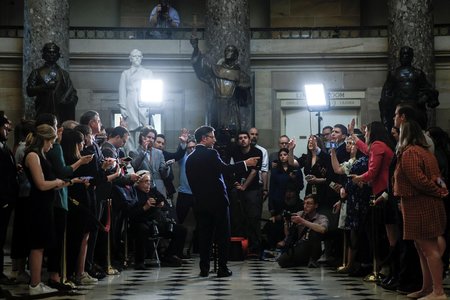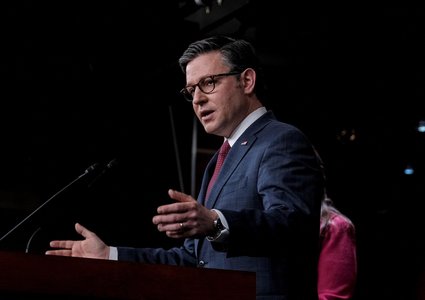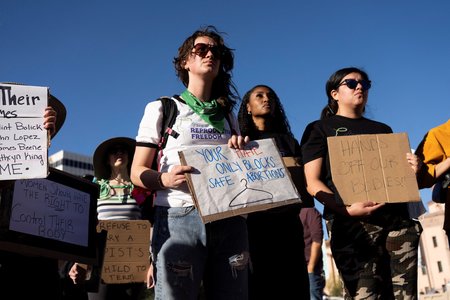Full Episode: Donald Trump and Hillary Clinton trade accusations of racism, Trump rethinks immigration and Clinton defends family foundation
Aug. 26, 2016 AT 4:13 p.m. EDT
TRANSCRIPT
Notice: Transcripts are machine and human generated and lightly edited for accuracy. They may contain errors.
SUSAN DAVIS: Presidential politics went from unpredictable to unbelievable this week. Donald Trump and Hillary Clinton exchanged charges of bigotry, paranoia, and corruption. And that’s just the half of it. I’m Susan Davis, filling in for Gwen Ifill, tonight on Washington Week.
The presidential race gets personal as Donald Trump and Hillary Clinton exchange insults and accusations of racism and bigotry.
FORMER SECRETARY OF STATE HILLARY CLINTON: (From video.) From the start, Donald Trump has built his campaign on prejudice and paranoia.
DONALD TRUMP: (From video.) She lies, and she smears, and she paints decent Americans – you – as racists.
MRS. CLINTON: (From video.) He says he wants to make America great again. His real message seems to be make America hate again.
MR. TRUMP: (From video.) Hillary Clinton is a bigot who sees people of color only as votes.
MS. DAVIS: We will get analysis on Trump’s decision to dial back his hardline stance on immigration, and support for mass deportations, and the new questions about a possible connection between the Democratic candidate and donors to the Clinton Foundation when she was secretary of state.
Joining us, Robert Costa, national political reporter for The Washington Post; Jeanne Cummings, political editor for The Wall Street Journal; And Jeff Zeleny, senior Washington correspondent for CNN.
ANNOUNCER: Award-winning reporting and analysis. Covering history as it happens. From our nation’s capital, this is Washington Week with Gwen Ifill. Once again, from Washington, sitting in for Gwen Ifill this week, Susan Davis of NPR.
MS. DAVIS: Good evening. Hillary Clinton did everything but call Donald Trump a racist during a campaign stop in Nevada this week. She accused him of race baiting.
MRS. CLINTON: (From video.) I hear and I read some people who are saying, well, his bluster and his bigotry is just overheated campaign rhetoric, an outrageous person saying outrageous things for attention. But look at his policies. The ones that Trump has proposed, they would put prejudice into practice.
MS. DAVIS: It didn’t take long for Trump to push back after he called his Democratic challenger a bigot.
MR. TRUMP: (From video.) When Democratic policies fail, they are left with only this one tired argument: You’re racist, you’re racist, you’re racist. They keep saying it. You’re racist. It’s a tired, disgusting argument. And it’s so totally predictable. They’re failing so badly.
MS. DAVIS: Both candidates stepped up their rhetoric in ways we haven’t seen before. Jeff, you were with Clinton yesterday when she gave this speech. What is motivating this new, sharper line of attack against Donald Trump?
JEFF ZELENY: Well, I think one thing is first and foremost. She wants to stop any pivot that may be going on, or any attempt at a pivot that Donald Trump is doing. I mean, he has changed his campaign in many ways in recent days. He’s addressing small, Hispanic audiences and African-American audiences. And he’s softening his tone sometimes, sometimes not. But I think the Clinton campaign, and she wants to shine a light on everything that he’s been saying, his greatest hits, if you will, his most controversial hits. And they want to freeze this race in place where it is right now. They do not want it to get away from it.
But I was struck in the audience watching her speak, it was not like any other Trump speech we’ve heard where she mocks him and says he’s not ready for the Oval Office. Her tone was so different. We’ve seldom heard her tone like that. And she mentioned so many Republicans. Bob Dole – she said in 1996 he said: If you’re a racist, leave this convention hall. George W. Bush, who embraced Muslims after 9/11. John McCain, who, you know, said Senator Obama is a good family man, on and on and on. Speaker Ryan, she came to his defense, Ted Cruz’s defense, saying Donald Trump is not a normal Republican.
I mean, I don’t know how many Republicans are going to accept her olive branch or accept her hand, but that’s who she was trying to speak to yesterday. We’ll see if it worked. She definitely drew attention to the fact that this is not a normal race.
MS. DAVIS: So she, in this speech, is trying to tie Trump to what is called the “Alt-Right.” I think this is a new term for a lot of people. What exactly is the “Alt-Right”?
MR. ZELENY: Well, she actually read a definition from The Wall Street Journal. “Alt-Right,” not – you know, she could have chosen a lot of publications. She decided The Wall Street Journal.
JEANNE CUMMINGS: But she chose the best. (Laughs.)
MR. ZELENY: Exactly. And the “Alt-Right” movement, by and large, is, you know, the – as she said, it’s the, you know, conspiracy theories from the darkest corners of the Internet. It’s white supremacists. It’s nationalists. That’s not necessarily right, but it is the – it’s different than your traditional GOP. It is, you know, basically what Breitbart, the conservative news site, hosts, who now is the CEO of the Trump campaign – he is the leader of the “Alt-Right” movement. So this is what she was trying to think scare people with that term and definition. But it is something that has given rise to – or given attention to a lot of conspiracy theories that she says don’t exist.
MS. DAVIS: Robert, we have the Democratic nominee calling the Republican nominee a racist this week – or linking him to racist ideologies. Where were all the Republicans defending Donald Trump? We didn’t seem to hear a lot of that.
ROBERT COSTA: A lot of Republicans are reluctant – especially if they’re in their own reelection races – to be out there forcefully as an advocate for Donald Trump on these racial kind of controversies, or racially tinged controversies, because when you look across the map in swing states like North Carolina and Pennsylvania and Ohio there are competitive House and Senate races, Illinois, New Hampshire as well. And to inject race into any of these contests, it makes a lot of leaders in Congress and elected officials wary. And that’s why you see House Speaker Paul Ryan, Senate Majority Leader McConnell, they’re trying to run focused, Capitol Hill-concentrated campaigns on their own tax agendas, traditional Republican orthodoxy, that they’re fine with linking themselves in ways to Trump’s populism, but they really want to run their own races.
MS. DAVIS: The week started with Trump launching a planned outreach to minority voters, who polls show he’s struggling to win over. This is what he had to say.
MR. TRUMP: (From video.) You’re living in poverty. Your schools are no good. You have no jobs. Fifty-eight percent of your youth is unemployed. What the hell do you have to lose? (Cheers.)
MS. DAVIS: Jeanne, is what the hell do you have to lose a message that is working with black voters?
MS. CUMMINGS: No, it’s not. And the initial reactions – there were many influential African-American leaders who were offended by it. They need help. Both sides know it. And the idea that, well, just vote for me because, you know, you’ve got that crappy neighborhood and, you know, it couldn’t get worse, could it, is just really insulting. And there are many, of course, African-Americans who are not in those neighborhoods who were also insulted. They’re in the middle class. They’re wealthy. And so it just kind of painted them all with a really wicked brush. And so that – I have yet to see, other than attacking the Democrats, Donald Trump put out any kind of coherent, real policy-oriented, this is a good reason for a Hispanic, an African-American, or any other minority to vote for him.
MS. DAVIS: But, Robert, is this conversation really about Trump reaching black voters?
MR. COSTA: Well, there is a theory in a lot of Republican circles, and some Democrats certainly view it this way, that Trump’s pitch to African-American voters is, in part, directed to trying to increase his numbers, which are in the low single digits among African-Americans and Latinos. But it’s really in a way also to reassure skittish suburban voters, women in the suburbs of these swing states we’ve been talking about, who see Trump as an intriguing figure because he’s not a normal Republican, doesn’t follow traditional Republican ideas. But if they want to move in that direction, he can’t have this racial sheen on top of his candidacy. So Trump making this overt pitch is, in part, trying to wash that sheen off.
MS. CUMMINGS: Well, the problem he’s got with suburban women, though, go well-beyond this. And these kind of blunt appeals to minorities don’t show compassion. They just show that he wants their vote. But they also don’t go anywhere near addressing the women – the insults to women that began very early in his candidacy, went on for way too many months during the primary. He has stopped saying things like that of late, but the Clinton campaign has the clips.
MR. ZELENY: And they want to remind people of everything that he’s said. I mean, that is the goal of the Clinton campaign. We’ve seen – every day almost there’s a new web ad that’s released, a lot of paid advertisement as well, simply playing back Donald Trump’s own words. That’s the soundtrack of this campaign on their side. Her ads use his own words, I mean, markedly more than her own words – which, you know, is often how it is. But think how many hours of tape there is of Donald Trump, all the interviews he’s done. And they are happy to play them.
MR. COSTA: And one thing I was really struck by in my reporting this week was Trump himself has often thought of himself as a public figure who has some popularity with African-Americans, with minority voters because of his lifestyle, his wealth and success. But when the Trump campaign and the Trump organization have done research, they’ve shown themselves internally that ever since 2011, 2012, when he was doing the birther crusade against President Obama, questioning his love of country and his credentials, his numbers with those specific demographic groups have plummeted. And that’s left him in this vulnerable position in the low single digits.
MS. DAVIS: Well, let’s talk about another demographic group, because this week we also saw what could have been a remarkable change of position from Donald Trump on immigration. He seemed to soften his position about what to do with the undocumented living here. Is this a reflection of the new management at the Trump campaign?
MR. COSTA: So you do have Steve Bannon, the populist nationalist flamethrower at the top of the campaign as CEO. And you have Kellyanne Conway, a pollster who’s long tried to get Republicans to moderate their tone on certain issues. But I think it’s a broader discussion from within the Trump campaign.
You have Rudy Giuliani, a confidant of the candidate, Chris Christie, the New Jersey governor, Kellyanne Conway, versus this Jeff Sessions-wing of the campaign – the Alabama Senator – Stephen Miller the policy director, Steve Bannon, the new CEO of the campaign. And there are these two camps that aren’t exactly at war with each other, but they’re pulling and tugging at Trump telling him: To win, you have to do X. You either have to fuel up your populism, or maybe you have to tone down your rhetoric on immigration. And that’s where Trump is right now, spending every weekend at Bedminster, New Jersey hearing from these two sides.
MS. CUMMINGS: But it seems like no matter which – all these mixed messages just ended up making him make it worse, because he was not clear. And so he took it from the conservatives. He took it from his own party’s more moderate wing. He took it from his ex-primary opponents. He drew so much criticism at the end of the week, and that was self-inflicted, which is so often the case with Donald Trump.
MR. ZELENY: I also talked to a few Republicans this week though who are like, you know, he’s confusing the issue enough. Again, it doesn’t make him look like he’s so entrenched in that position. He still says, I’m going to build the wall. I think people – the voters I’ve talked to out there. They like when he says that. They don’t know if he will or not, but they like what that stands for, much more than the deportation force. That is very controversial.
But he has confused this issue. And in some ways that could be helpful to him. The risk is, if Sarah Palin and others – she was in The Wall Street Journal this week, you know, sounding the alarm. If she actually starts sounding the alarm with her megaphone, that could be a huge problem for him.
MS. DAVIS: Well, that seems to be a key question, right? Over and over we’ve heard that there’s nothing that Trump can do to shake his sort of fundamental, core support. But does changing one of his core positions in immigration, could that hurt him with his most strongest supporters?
MR. COSTA: Well, we always remember that line: I could go on Fifth Avenue and shoot somebody and I would still have their support. That’s been Trump’s view for much of the campaign. It’s been striking to see one of Trump’s most full-throated surrogates, Ann Coulter, the controversial firebrand commentator coming out with a book this week about trusting Trump and seeing him as a trustworthy figure. And she made the wry remark that her book tour could be pretty short if Trump keeps moderating and changing his position on immigration.
For now, we’re seeing the right wing of the GOP stick with Trump. They think at his core – if you listen to Rush Limbaugh’s show or talk to different people on the right – they still think Trump’s Trump, and he’s going to build the wall. But there’s more reservation on that side.
MS. DAVIS: Jeanne, Clinton had her own troubles again this week. There was another story about the Clinton Foundation and her time at the State Department, and new questions raised over the appropriateness of that relationship. Where are we on that? And how much is this affecting Clinton with the way voters see her?
MS. CUMMINGS: Right. This week started out to be one of Hillary Clinton’s worst weeks. And they brilliantly changed everything at the end with the speech that she gave on race. And he gifted her with the mistakes he made on immigration. But at the beginning of the week, what we were all focused on was the release of her private calendar, her meetings that she had at the State Department, and cross-referencing them. Some of those meetings were with substantial donors to the Clinton Foundation.
So ethical questions were being raised. If you made – cut a big check to the Foundation, did that buy you into a State Department luncheon, discussion on this policy? Or could you gain access to a certain expert inside of the State Department? Those were some of the issues that were beginning to bubble up. The campaign pushed back very hard on this, by noting that she has thousands – she had thousands of meetings. And this constitutes only a handful in comparison – some tiny fraction of the full menu of meetings that she had over the course of the two years that were under scrutiny.
But those are the questions that she was beginning the confront. The conversation changed dramatically by the end of the week. However, new records are going to be released later both of her calendar, and more emails are coming. So she’s not out of the woods yet.
MR. ZELENY: It’s striking to me that we are still – I mean, almost at Labor Day, almost beyond, and they still have not resolved this email controversy. It is frustrating to many people inside her campaign. It’s frustrating to many Democrats that I was speaking to all week, and this is an issue of the Clintons’ own making. From the very beginning, when she decided to put that private server in her house when she was the secretary of state, many people believe because they didn’t want this to come out about, you know, who she was meeting with, the donors and other things. But it is – it’s frustrated a lot of her supporters how slow they have been to dispatch with this. And there are 15,000 new emails and other documents that are being reviewed now that the FBI found during their yearlong investigation. The State Department is going back through them again. We don’t know if there’s anything – any smoking gun in there. So far there hasn’t necessarily been. But it creates the appearance of conflict. And with the Clintons, when her trustworthiness is that sort of in the mud, it is a problem. And Democrats, if they’re being honest, will say it is a problem. If it was running against anyone other than Donald Trump, she would be in a world of hurt right now.
MS. CUMMINGS: And these are all coming when she actually was starting to make progress on the trustworthy question. He convention did her some good, and she was starting to improve those numbers a little bit. And here we are again, and we’re going to be here again and again.
MS. DAVIS: As we sit here today, we’re about 10 weeks from Election Day. Robert, Donald Trump did not have a great August. What is his campaign telling you about how they want to spend the next 10 weeks?
MR. COSTA: Well, one of the most important moments will be the debates. And so you have a month now before the first debate, and they’re going to be preparing him, but not usually in a formal mock debate style way. You’re going to have Trump having conversations with Giuliani and Chris Christie and Newt Gingrich and trying to think through his positions. They’re going to do the outreach to the African-American community. Ben Carson tells me he wants to show Trump around his home city of Detroit in early September. And you’re also going to see Trump try to catch up to the Clintons on the ground game. On Friday afternoon, the Trump campaign released a new application for people’s phones to try to do door-knocking and all these things where you can move from being apprentice level to “Make America Great Again” level to big league level. And so it shows you, though, that the Trump campaign recognizes the Clintons are so ahead when it comes to advertising, when it comes to strength on the ground, and in these swing states, and they have to do something to catch up even if they’re not going to be out there matching them on point via point.
MS. DAVIS: Jeanne, what do the polls tell us about how many voters in this election still truly don’t know who they’re going to vote for this November?
MS. CUMMINGS: We do have a fair number of I don’t know yet. It’s still – it’s still – it’s not unusually large. What’s different, that we don’t see all the time, is that all of us who do – our outlets do polling have had to add this “neither” question, because that we were getting spontaneously from the people we were surveying. And so our professional pollers said we got to – we got to give them this option because there are so many of them. And that hovers around 7 or 8 percent or something, and that’s a significant number, especially when we have a four-way race and the alternative candidates are drawing a little bit more, a little higher. And then you have this big batch of people that are just sort of frozen, that don’t know what to do.
But to put some numbers on what Robert was just mentioning – and you know, here we are, Labor Day is almost upon us, and I mean, the – Hillary has reserved $80 million in television advertising through August. Donald Trump has reserved 5 million (dollars). That’s how they’re – the Clinton campaign, the number of people they have on the ground in North Carolina and Ohio is more than Trump has on the ground in the country.
MS. DAVIS: Wow.
MS. CUMMINGS: That’s how different the two campaigns are.
MS. DAVIS: Well, Jeff, we know the battleground is shifting. It seems to be narrowing. Where is Hillary Clinton devoting her resources now in the home stretch?
MR. ZELENY: They are still focusing on actually a pretty broad battleground. I mean, they are nervous in some respects that August may have been sort of too rosy for them, and it’s one of the reasons she gave a speech, again, to try and stop a pivot here. But North Carolina is central. I think that if she wins in North Carolina, you have to say that it’s difficult for Trump to win the presidency. Not impossible, of course, because mathematically it’s possible, but that is sort of a symbolic new battleground. Ohio, of course, as well. But the three – Florida, Ohio North Carolina – are there states where she is so focusing on. A place like Virginia, which we thought would be the center of everything, it’s not; she’s up, most polls say, double digits.
MS. DAVIS: North Carolina is a very interesting state to watch this election cycle. Thank you all for being here.
MR. ZELENY: Thanks, Sue.
MS. DAVIS: We have to go a few minutes early this week to give you the chance to support your local station, which in turn supports Washington Week. But the conversation continues online on the Washington Week Webcast Extra, where among other things we’ll discuss the high-level negotiations surrounding the presidential debates. It’s not as simple as you may think. And while you’re there, have a little fun testing your knowledge of current events on the Washington Week News Quiz. That’s later tonight and all week long at PBS.org/WashingtonWeek.
Gwen Ifill will be back next week. I’m Susan Davis. Thanks for tuning in. Have a good night and a great weekend.
MOST POPULAR


Full Episode: Washington Week with The Atlantic full episode, 4/19/24


Clip: Will Democrats rescue Johnson's speakership to protect aid for Ukraine and Israel?


Clip: Attacks in Israel and Iran bring more uncertainty to Middle East

Preview: Coming Up on Washington Week with The Atlantic


Full Episode: Washington Week with The Atlantic full episode, 4/12/24

© 1996 - 2024 WETA. All Rights Reserved.
PBS is a 501(c)(3) not-for-profit organization


